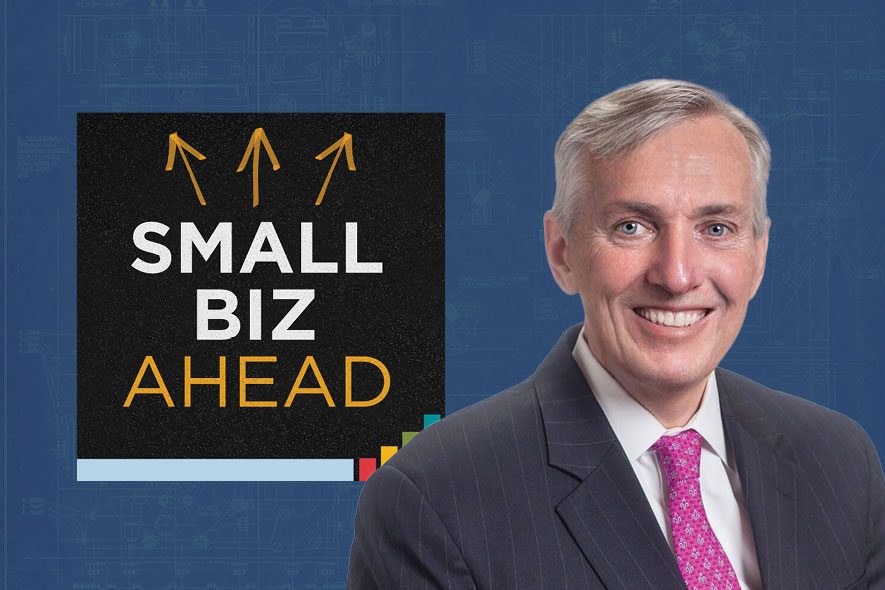Transcript
The views and opinions expressed on this podcast are for informational purposes only, and solely those of the podcast participants, contributors, and guests, and do not constitute an endorsement by or necessarily represent the views of The Hartford or its affiliates.
You’re listening to the Small Biz Ahead podcast, brought to you by The Hartford.
Our Sponsor
This podcast is brought to you by The Hartford. When the unexpected strikes, The Hartford strikes back for over 1 million small business customers with property, liability, and workers compensation insurance. Check out The Hartford’s small business insurance at TheHartford.com.
Gene (00:02):
Hey everybody, this is Gene Marks and welcome to another episode of the Hartford Small Biz Ahead podcast. Thank you so much for joining me. As I run around the country and speak to so many different business groups, across all different industries, there is one thing that I notice when I look out at the audience. Business owners are kind of old. We hear a lot about the younger millennials or even Gen Zers, the tech startups, the cool hot businesses that get a lot of attention. But, the bottom line is the SBA, the Small Business Administration actually has reported that more than half of U.S. small businesses are over the age of 50. The average age of the U.S. small business owner is actually 55 years old, which brings me to the topic of today, which is employee stock ownership plans.
Gene (00:52):
Now, I do plan on talking a little bit more on this podcast in the future about sort of succession planning and exit strategies. And this is one of them. I wanna make sure that you’re very, very familiar with. And by the way, this is not an old person thing. This is if you’re running a business of any size, this is something that you may really want to consider because ESOPs employee stock ownership plans and other types of entities like cooperative ownership plans, have grown significantly over the past few years, and I expect them to grow even more in the coming years as a lot of business owners are looking to exit out of their business and are looking for a vehicle to do that. Now, if you’re running a business in a part of the country that might be beautiful and a great place to bring up a family, it still might not be so attractive to a potential buyer.
Gene (01:41):
So a lot of my clients, a lot of the people that I talk to, they’re starting to realize that and they wanna exit. They wanna get value for their business. And a lot of them are realizing that the potential buyers are right there working for them in their businesses. And that’s why ESOPs have become such a really great idea for a lot of business owners that are looking to try and exit their way out. So, here are some thoughts on an employee stock ownership plan that you should really consider. For starters, you don’t have to sell your whole business. You can sell 10% of it or 20% of it. You can do it gradually over time. I’ve written about this topic both for the Philly Inquirer and the Chicago Daily Herald, and most of the people that I talked to, they sold their businesses over a period of years.
Gene (02:25):
So you don’t have to, this isn’t all complete outright sale. That’s number one. Number two, setting up an ESOP is complicated, mainly because you’re dealing with a separate entity. So here’s how it works. A separate entity is formed and that entity is owned by your employees, which by the way includes you because you’re an employee of your company. Right? Now, that entity, the ownership of it, can be determined based on a lot of different factors. It’s up to you. It can be based on compensation, it can be based on title or tenure. Different companies…
Gene (02:58):
Do it it different ways. Once that entity is set up, the entity purchases shares of your business and again, it does not have to be a hundred percent. Now, the employees that are part of that entity, do they have to come up with the money to buy you out? No, they do not. Usually it’s financed by a bank. Sometimes it’s seller finance, but usually it’s financed by a bank, which means a bank does the financing deal and you get a check for your shares, whether you sold 10%, 20%, or 100%, the bank gives you the check based on an independent valuation of your business. Here’s some of the huge tax advantages. Once you actually sell your business or shares of your business to, and the bank pays for it, your business is gonna be paying back the bank. But now because of the rules, your business gets a full tax deduction for both the principle and the interest as they pay back the bank.
Gene (03:54):
That is a huge tax incentive. Wanna know another huge tax incentive? Whatever share of your business that, that ESOP entity owns, say it’s 20% or 30%, 80%. The income that’s allocated to that entity is non-taxable. So when you hear of like companies that are a hundred percent employee owned and they’re like, yay, we’re a hundred percent employee owned. Good for them, they’re not paying any taxes because the share of the entity that is allocated to the ESOP entity, the share of your business, if the taxable income, the the income itself is not taxable. It is a huge tax saving vehicle. I have a lot of owners that have sold out portions of their businesses to an ESOP and then use the tax savings, to turn around and finance growth of their business to buy machinery and equipment or even hire more employees.
Gene (04:46):
So those are two big tax advantages. You get to deduct the principle and interests. You’re paying back the loan. Your businesses and your income is non-taxed. Whatever it gets allocated to that ESOP entity. Here’s another huge advantage. It’s an amazing employee benefit, particularly in these times where employees want to have more of a say, in the companies that they work for. Well now you can give them that, now they don’t have to have control of your business if you sell less than 50%. But what can happen is they, they get a little piece of the pie, they get that equity. ESOP owned companies have shown that they are more profitable and more productive than other companies, according to numerous studies. And the employees themselves get to really put away on their own their retirement money. This is in addition to the 401k or any kind of pension plan your company might have as your company grows and the value of the shares get more and more valuable. Your older employees, when they ultimately do retire, can cash out on a big retirement, which does bring me to some of the downsides. When an employee leaves or retires from your business, you gotta pay help. So your business has…
Gene (05:56):
To make sure that you’ve got cash available to do just that. In addition, maintaining an ESOP can be pretty expensive. I mean, you’ve got regulatory filings. This is a benefit plan. So it’s like ERISA filings you have to consider. You also have to get an independent valuation done every year. Like I said earlier, you’ve gotta pay out those employees that leave your company. In addition, you’re gonna have tax fees or attorneys fees. The people that I talked to said that, that the cost annually of maintaining an ESOP can be tens of thousands of dollars a year depending on the size of the ESOP and the complexity. And one other thing that’s complex about an ESOP is it doesn’t happen overnight. I mean, you’re now involving a lot of other parties in your business, so you have to consider that. You have to be patient as you form it.
Gene (06:40):
And finally, in an ESOP, you’re sharing your information, right? I mean, now these employees that might not have known what your revenues or your profits are, now they do know because well their owners of the company. So they have a right to know. Now you’ll have a board of directors, as management, you’ll still be running the company, but your employees will be represented by some type of a trustee, that will be looking after their interests as well and be part of your board. So all those have to be taken into consideration. The bottom line is, though, is that it’s become a really, really popular growing in popularity vehicle for exiting your business over time. And as a great employee benefit to provide employee-owned companies. Like I said, it’s, it’s really a good modern thing to do.
Gene (07:24):
So if you’re interested in doing it, you should definitely talk to an attorney or an accountant or an expert that specializes in ESOPs. And if you wanna leave any notes to this podcast or if you want to email me directly at gene@marksgroup.net, I’m more than happy to give you some referrals and introduce you to people that specialize in setting up ESOPs. It is absolutely worth something that you should consider because it could really be a great long-term exit and a great employee benefit for your company. So those are my thoughts on ESOPs. This is why you should be considering one. Definitely for now, start laying the groundwork and the supplies. Even though most business owners are over the age of 50, more than half, it supplies to business owners of all ages because it is a great planning tool to do. Hope this information helps. My name is Gene Marks. If you need any advice or tips or help in running your business, please visit us at SmallBizAhead.com or SBA.TheHartford.com. I’ll be back to you next week with another episode of the Small Biz Ahead Podcast. Look forward to doing that. Speak to you soon. Take care.
Download Our Free eBooks
- Ultimate Guide to Business Credit Cards: The Small Business Owner’s Handbook
- How to Keep Customers Coming Back for More—Customer Retention Strategies
- How to Safeguard Your Small Business From Data Breaches
- 21 Days to Be a More Productive Small Business Owner
- Opportunity Knocks: How to Find—and Pursue—a Business Idea That’s Right for You
- 99 New Small Business Ideas





